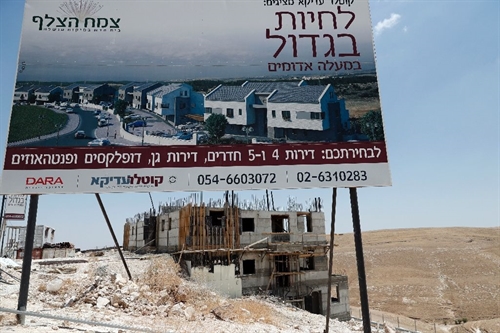 World
World

Israel has approved hundreds of new settler homes in the occupied West Bank, an official said on Monday, in a move denounced by UN chief Ban Ki-moon and likely to further raise tensions following a series of Palestinian attacks.
 |
| Buildings under construction are seen in the Israeli settlement of Maale Adumim, east of Jerusalem, in the occupied West Bank, on July 4, 2016. — AFP/VNA Photo |
JERUSALEM — Israel has approved hundreds of new settler homes in the occupied West Bank, an official said on Monday, in a move denounced by UN chief Ban Ki-moon and likely to further raise tensions following a series of Palestinian attacks.
The approval comes days after a key international report warned that Israel’s settlement expansion and confiscation of Palestinian land were eroding the possibility of a two-state peace settlement.
The report from the diplomatic Quartet - the United States, European Union, United Nations and Russia - also called on Palestinians to halt attacks and incitement to violence.
Under the new approval granted by Prime Minister Benjamin Netanyahu and Defence Minister Avigdor Lieberman, planning for 560 new Jewish homes in the large Maale Adumim settlement east of Jerusalem will be allowed to move forward.
The Maale Adumim mayor was informed of the decision on Sunday night, a spokesman for his office said. The settlement founded in 1975 already has a population of more than 37,000.
Netanyahu also gave approval for the planning of 240 new homes in settlement neighbourhoods of annexed east Jerusalem, as well as for 600 units for Palestinians in the city’s Beit Safafa district, media reported.
The offices of Netanyahu and Lieberman refused to comment on the reported approvals, which follow calls inside Israel for a harsh response to the latest spate of Palestinian attacks.
On Thursday, 13-year-old Israeli-American Hallel Yaffa Ariel was fatally stabbed in Kiryat Arba settlement on the outskirts of the flashpoint West Bank city of Hebron.
Her 19-year-old Palestinian assailant was then shot dead by a security guard.
A day later, Sarah Tarayra, 27, was shot dead after drawing a knife on Israeli forces in Hebron. She was a relative of the Kiryat Arba attacker.
’Aggressive measures’
Also last Friday, 48-year-old Israeli Michael Mark was killed when his car was fired on by suspected Palestinian gunmen south of Hebron.
The same day, Israel announced a lockdown in Hebron as it searched for the gunmen and it reduced the monthly tax payments to the Palestinian Authority as a retaliatory measure.
Israel transfers around US$127 million in customs duties levied on goods destined for Palestinian markets that transit through Israeli ports monthly.
The measures, which also included increasing Israel’s military presence in the West Bank, were described by the army as "the most substantial" in two years.
UN chief Ban was "deeply disappointed" that Israel’s decision to expand settlements came just days after the Quartet’s report, his spokesman said.
Ban said that "settlements are illegal under international law" and called on the Israeli government to "halt and reverse such decisions in the interest of peace and a just final status agreement".
Saeb Erekat, secretary general of the Palestine Liberation Organisation, condemned the new settlement approvals as well as the lockdown on the Hebron region.
"The reason for the continuation and the diminishing and declining prospects for the two-state solution is not incitement. It is the occupation itself," Erekat told journalists in the West Bank town of Ramallah.
"A good example, just 24 hours after the release of the Quartet report (on Friday), the governorate of Hebron with its population of around 700,000 people is under total military siege."
Hebron has long been a flashpoint in the conflict, with hundreds of Jewish settlers living under heavy military guard in the heart of the city among some 200,000 Palestinians.
A wave of violence since October has killed at least 214 Palestinians, 34 Israelis, two Americans, an Eritrean and a Sudanese.
Most of the Palestinians killed were carrying out knife, gun or car-ramming attacks, Israeli authorities say.
Others were shot dead by Israeli security forces during protests and clashes or killed in Israeli air strikes in the Gaza Strip.
The violence had subsided in recent weeks, before a deadly shooting at a Tel Aviv cafe by two Palestinians on June 8 and last week’s attacks.
During a recent visit to Israel and the Palestinian territories, UN leader Ban condemned Palestinian attacks as "terrorism" but also said Israel must act to address "key underlying causes of violence".
They included "growing Palestinian anger, the paralysis of the peace process, the nearly a half-century of occupation", Ban said.
Peace talks have been at a complete standstill since a US-led initiative collapsed in April 2014. — AFP




